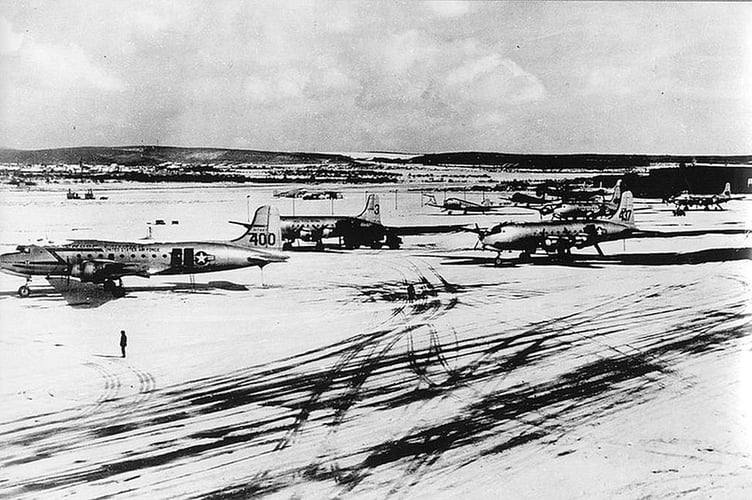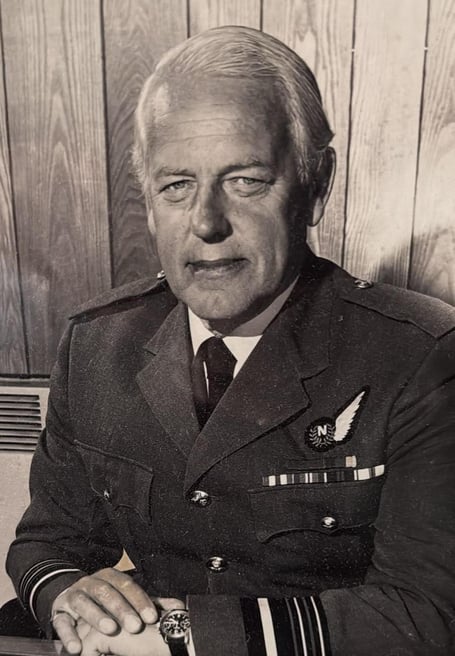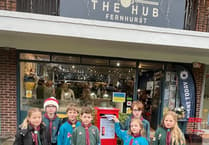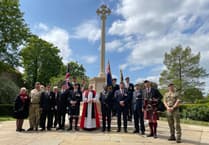From his home in Hampshire to the skies over Berlin and the South Atlantic, Air Marshal Sir John Curtiss helped shape some of the most decisive moments in modern British military history.
Now, more than a decade after his death, his son is sharing rare memories of the twice-knighted RAF hero in a new podcast that combines personal insight with his father’s own reflections.
Sir John, who settled in Hampshire after an extraordinary career, was one of the RAF’s most respected officers of the post-war era. Over four decades of service, he rose from a teenage recruit from New Zealand to become the first navigator in RAF history to reach the rank of Air Marshal.
Along the way, he flew more than 260 missions into blockaded Berlin during the 1948–49 airlift, commanded British air operations in the Falklands War, and became known among colleagues as “Laughing John” for his booming laugh and cheerful spirit.
His son, Peter Curtiss, said he wanted to keep his father’s story alive for future generations. “I want people to know who my father really was,” he explained.
“He didn’t just serve – he shaped history. He flew hundreds of missions into a starving city during the Cold War’s most dangerous standoff. And when the Falklands happened, they turned to him again.”
The Berlin Airlift remains one of the Cold War’s most remarkable humanitarian efforts. In June 1948 the Soviet Union blockaded West Berlin in an attempt to starve the Allies out of the city. For 11 months, British and American aircraft flew day and night, delivering food, medicine and coal to more than two million civilians.
Curtiss alone completed 263 flights into Gatow airfield, describing the operation as “the moral victory of the century.”

“He never forgot it, and was immensely proud,” Peter recalled.
“He believed it was one of Britain’s finest moments – saving a city without firing a shot. He kept every speech and article about it, even wrote one called The Victory That Britain Forgot. He was furious when the Post Office refused to issue a commemorative stamp. He thought the nation owed it more recognition.”
Sir John’s journey began in 1942, aged 17, when he left New Zealand to join the RAF Volunteer Reserve. His handwritten diary from the voyage, running to 70 pages, remains his treasured family record. Initially training as a pilot, he was later selected for navigation and flew 28 missions with Bomber Command over occupied Europe.
After the Berlin Airlift he rose steadily through the ranks, serving in senior positions including station commander at RAF Bruggen, Commandant of RAF Staff College, and Air Officer Commanding No. 18 Group, overseeing maritime air operations.
His most prominent role came in 1982 when, as the Falklands conflict erupted, he coordinated British air assets, including Vulcan bombers flying long-range raids from Ascension Island. His leadership earned him a knighthood, followed by a second, making him one of the few officers to hold both the KBE and KCB.
Behind the medals, though, was a man remembered by family and friends for warmth and generosity. “He adored his family. He was devoted, warm, and had a huge laugh that lit up a room,” Peter said.
“But he was quietly proud of what he’d done. He never bragged. He always knew how important the Airlift was for Berlin and Europe. Without it, he said, the Soviets would have taken the city.”
Sir John retired from the RAF in 1983 but remained active in defence and aviation circles. He was a leading figure in the British Berlin Airlift Association and attended commemorations into his 80s. He died in 2013 at his Milford-on-Sea home, surrounded by family. He left four children and eleven grandchildren.
The new podcast series, The Veterans’ Voice: Berlin Airlift, produced by the military history charity Legasee Educational Trust, uses interviews recorded with Sir John shortly before his death to bring his voice back to the public.
Alongside his recollections, Peter shares his own memories, offering a rare glimpse of the man behind the uniform.
Martin Bisiker, founder of the charity, said Sir John’s story carried lasting lessons. “He was one of the RAF’s most decorated and respected figures, but also a man who inspired through his integrity and courage. Sharing his voice and Peter’s memories ensures future generations can connect with the human side of these historic events.”
For Peter, the motivation is simpler: making sure history remembers a man who helped change it. “He just got on with it, like many of his generation,” he said. “But it’s vital his story is remembered, because he helped shape events we still live with today.”




_-004.jpeg?width=209&height=140&crop=209:145,smart&quality=75)
Comments
This article has no comments yet. Be the first to leave a comment.